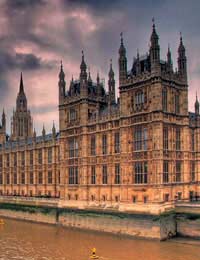The Government in the UK

The Government in the UK is directly elected by the people of the country. All British citizens over 18 are allowed to vote in elections, both for local and national Governments. There is usually an election every year although it can be as long as five years in between general elections – when members of Parliament are elected.
Our elected representatives then make decisions on a wide range of topics which affect every aspect of our daily lives, so it is vital when voting to think carefully about who you want running your country.
The Voting System
The voting system in the UK is relatively straightforward. Votes are counted up on a first past the post basis which basically means that the person who wins the most votes wins the election – as straightforward as it gets.Elections for members of Parliament are held every five years or more often if the sitting Government calls it. Once an election has been called, all seats in the House of Commons become vacant and all sitting MPs have to campaign for re-election alongside the other people vying for their seat.
MPs are voted for in their constituency and when elected represent that area. The Government is then formed from the political party which has won the most seats. If no party has more seats than the others put together then they are said to have no overall majority and there can be a hung Parliament where a coalition Government may have to be formed.
Parliament
Parliament is the UK’s government and sits in the Palace of Westminster in London. It comprises two houses, the House of Commons and the House of Lords. The former is elected by the people as outlined above and the latter are appointed although rules on how they are appointed have changed in recent years.The future of the House of Lords is still in flux. Its basic role is to read through and approve bills which the House of Commons have already passed in their debates. The Law lords also sit as the highest court in the land.
Local Government
In the UK, we also have a series of local Governments as well. These councils as they are known, can be district, city or county. They fall into two-tier areas and unitary authorities. In a two-tier area, typically a rural county with lots of towns and cities, there will be a county council which deals with bigger issues such as schools and highways and then a district or city council which deals with things such as street cleaning and refuse collection.Unitary authorities have just one council which deals with everything and this can be a district, city, county or metropolitan borough councils. In some areas there are also parish or town councils as well. In reality these councils have very few powers but do meet to debate issues which affect parishioners and can put pressure on the next tier of Government.
This is just a brief outline of the way Government in the UK works. It can be confusing when trying to work out exactly which council or Government is responsible for which part of daily life. One thing is for sure though and that is that all areas of our lives are affected by Government in some form. There are very few things which we do, be it work or leisure, which has not been impacted on by Government in some way.


Re: Being a Responsible Citizen
Suh
Re: Being a Responsible Citizen
I like it
Re: The Role of Volunteers
Everyone has importance in the society in different ways.
Re: Questionnaire: Do You Have Time to Be a Volunteer?
Great interpretation of results. However, various optional interpretations and generalization are not…
Re: Good Citizenship
I was denied citizenship because i am black, why is this
Re: The Role of Volunteers
Hello I would like to have volunteers to visit my organisation called the NISSI PROJECT, found in Uganda, Africa,we care about orphans and…
Re: Being a Responsible Citizen
you should adress the goverment departments and agencies they will manipulate situations , for thier benefit and outcome , and…
Re: Being a Responsible Citizen
I love this topic. This is what I have been preaching as an NGO. And the act of being responsible is transferable. Children watch…
Re: The Role of Volunteers
I desire to receive volunteers to my community. I need my community to be empowered and helped to reduce crime.We have an organization…
Re: Prejudice Towards Disabled People
i would strongly suggest using people first language disabled person is incorrect, it should be person with a disability